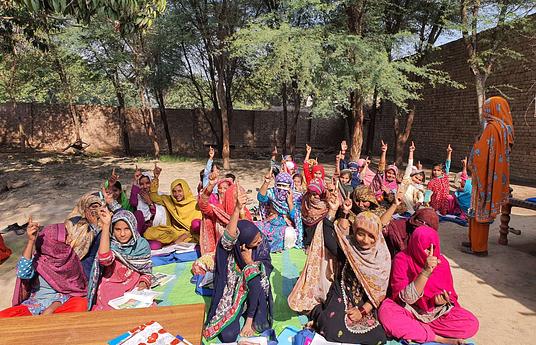Who we are
Aflatoun International is a non-governmental organisation delivering Life Skills and Financial Education programmes through a global network of 272 partner organisations and 35 governments. Since 1991, our mission is to ensure that children and young people are socially and economically empowered to become agents of change for a more equitable future.
We create curricula around social and financial education for children and young people of different age groups to learn about their rights, how to save and budget their money, and how to start small enterprises. Our network envisions that every child and young person gains financial independence through understanding their rights and responsibilities, being confident and self-efficient and developing healthy social and financial attitudes.
In 2019, our programmes were implementedacross 108 countries spanning 5 continents,including the majority of African countries, reaching a totalof 10.5 million children and young peoplethrough an innovative social franchise model. In 2020, despite the global COVID-19 pandemic, through its global network of partner organisations, Aflatoun reached 5.6 million children and young people: 3.1 million through civil society organisations, and 2.5 million through governments.
We are currentlyranked at #23on the list of World Top 500 NGOs by NGO Advisor. Our efforts to bring social and financial education to scale have been internationally recognised by The Brookings Institute in its reports Millions Learning: Scaling up quality education in developing countries and Can We Leapfrog? The Potential of Education Innovations to Rapidly Accelerate Progress and in Harvard’s Building Bridges for the Future. By the year 2020, our organisation aims to reach 20 million children by continuing our global initiatives.
How we work
Aflatoun International brings social and financial education to scale through an innovative social franchise model. The Secretariat office in Amsterdam provides technical support to local partners and stakeholders that are necessary to develop, implement, evaluate and scale up our Life Skills and Financial Education programmes.
We create our programmes with a holistic view that building financial capacity in children and young people begins with understanding their developmental needs. We co-develop our curricula with diverse groups of local stakeholders to ensure that we understand the contexts and realities inside and outside of the classroom. As a technical assistant, Aflatoun organises prior participatory needs assessments to further adapt lessons to fit the needs and circumstances of children and young people, especially the most vulnerable.
Life Skills and Financial Educations programming is facilitated through regional partners who use our curricula to benefit their programmes or existing projects. Aflatoun educators in our network receive high-quality training to get oriented to Aflatoun's child-centred and active learning methodologies. We offer regional training and workshops, and a refresher course for educators in our network to stay up to date on Aflatoun programmes.
In recent years, our organisation has expanded its services to work strategically with regional ministries of education and education authorities to integrate social and financial education into their national curriculum. We presently serve as a technical assistance provider by supporting 35 governments in our efforts to incorporate life skills and financial literacy training into core subjects of the national curricula. We believe that Aflatoun's influence will help prepare children and young people with the necessary skills that prepare them for their transition from the classroom.
Get to know our programmes
Aflatoun programming is based on four core curricula for different age groups of students in primary to secondary school which is flexible and can be contextualised to local needs through formal or non-formal settings:
• Aflatot (3-6 years old), offering helpful learning experiences during early childhood, which lay the foundation for children to reach their full potential;
• Aflatoun (6-14 years old), building on a child’s natural curiosity and teaches them about their rights, saving and starting enterprises. For those without access to schools and disadvantaged children, Aflatoun Non-Formal Education has been developed;
• Aflateen + (15-18 years old), stimulating young people to question their identity and to critically think about the role of gender and sexual reproductive health rights in their daily lives and relating these topic to money, stimulating young people to question their identity, learn about money and the economy, which prepares them for a complex and turbulent job market. Our eLearning Platform Aflateen Digital complements this programme;
• Aflayouth(15-24 years old), aims to help individuals build their professional skills, understand their goals in the labour market and make informed choices about their options in education, jobs and entrepreneurship.
Regional and national versions of our curricula have been created in 45 languages and have been adapted to complement programmes on issues as diverse as girls’ empowerment, peacebuilding and disabled learners. Our programmes increasingly combine face-to-face with on/offline digital learning for children and educators. We are continuously seeking to improve our blended learning provision. Learn more about our programmes here.
Impact and evidence
Aflatoun International’s Life Skills and Financial Education has proved to be effective in increasing children's and young people’s self-efficacy and confidence, in raising awareness of their rights, improving social behaviour and enhancing financial attitudes. It is one of the most well-researched international life skills programmes globally.
We currently have over 100 evaluations of our programmes, of which we utilize mixed methods to understand the efficacy of our programmes across multiple contexts. We seek to better understand (3) main outcomes from our programmes:
• Financial
• Social
• Educational
Impact evaluations of Aflatoun have been published in peer-reviewed journal articles. Within most rigorous studies in Ghana, Uganda, Rwanda, and Tajikistan, positive changes in children’s financial attitudes have been found in Random Control Trials.
Three new Randomized Control Trials were completed in 2020 (Burkina Faso, Cameroon & India). They found significant increases in children’s self-efficacy and empathy levels. In addition, students who received the programme significantly increased their saving behaviour and improved their entrepreneurial attitudes compared to students in comparison schools. To learn more, take a further look at our latest research publications.


